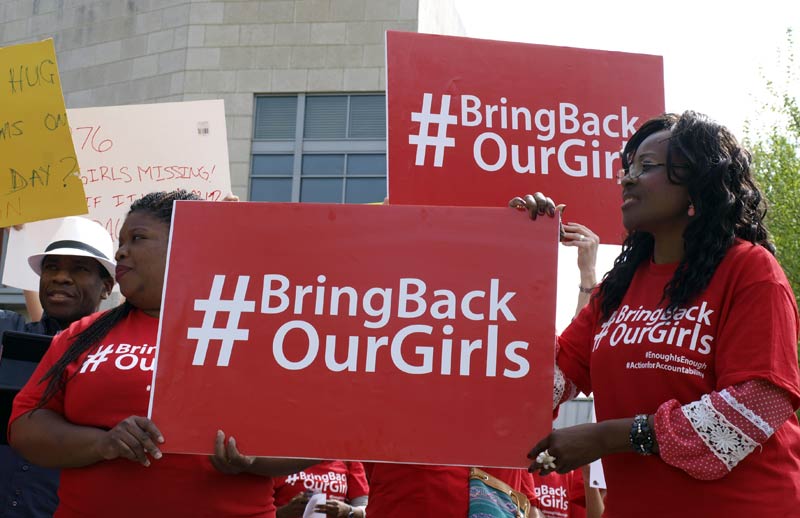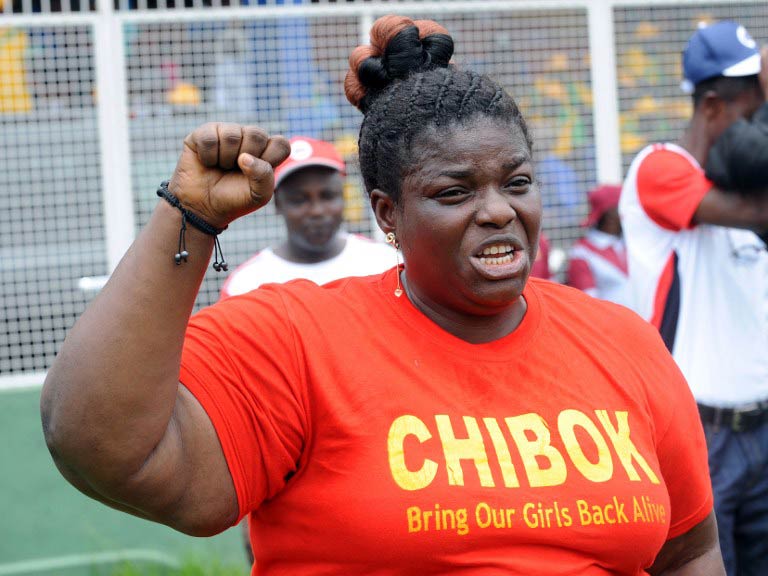I watched the first lady of my country, Nigeria, shed tears for the abducted Chibok girls over two weeks after they went missing. I didn’t actually see the tears fall: she covered her face with a large tissue.
Her husband, President Goodluck Jonathan, went on a political rally in the northern city of Kano two days after the girls were abducted. The 2015 elections are, after all, only a year away. Issues such as addressing the nation over the schoolgirl abductions, and the bomb blast in Abuja days later, which killed 70 people, are obviously less pressing in nature.
Yet on national television last Sunday, the president promised Nigeria: “Wherever these girls are, we’ll surely get them out.” It’s amazing what a little international scrutiny will do. We have discovered the power of the hashtag over the last week. The simple, emphatic demand #BringBackOurGirls has moved across the Twitter timelines of the famous and the unknown, uniting Nigerian housewives and the US secretary of state, Hillary Clinton. Protests have spread from Abuja to Lagos, London and Washington; CNN, the BBC, al-Jazeera and other international media organisations have flocked to the protest sites, building momentum. And now Barack Obama has called for the world to act against Boko Haram, the terror organisation that kidnapped the girls.

And yet, as elated as I am over the overdue coverage this issue is finally receiving, I cannot help but wonder what comes next. When the girls are released, will they be returned to a country where they are not at risk of being abducted again? Will they be released to families that are safe from the threat of Boko Haram attacks? Will they come home to a Nigeria where the money meant for their education, their health and their future is not siphoned off into accounts around the globe?
Viewing the events surrounding the Chibok abductions, I am reminded of the Occupy Nigeria protest of January 2012, when thousands demonstrated over the sudden removal of a national petrol subsidy, causing fuel prices to double overnight. Like the #BringBackOurGirls movement, Occupy Nigeria migrated from Twitter through street protests to international coverage. The government was forced to the negotiation table. As the world looked on, causing our leaders to squirm, it was the time for us to call for the Nigeria we wanted, to demand transparency, education and better infrastructure.
But the negotiators were blinkered. They could ask for only one thing: a restoration of the subsidy. And when the petrol pump price was reduced, although not to former levels, it was as if a small victory had been won.
What victory, when our legislators were still the highest paid in the world? When our children were still some of the most illiterate in the world? When our youths suffered one of the highest levels of unemployment in the world? None of these issues had been addressed, not even when the world was watching and our government, unembarrassed by the plight of its citizens, was shamed under the vast lens of the international media.
We cannot let this opportunity pass a second time, for who knows what even greater tragedy will cause the world’s attention to return to Nigeria? Now is the time for us to widen our protest; now is the time to ask what country these girls will be returned to.
What happened to the trial of Senator Ali Ndume, alleged sponsor of Boko Haram insurgents? Why, despite the billions allocated to defence, are the insurgents reportedly better equipped than our soldiers? Why do Nigerian girls remain among the most uneducated in the world? Why has polio not been eradicated in Nigeria? Where is the $20bn that our central bank governor discovered was missing from our treasury this year? And, of course: where are our girls?
This Friday I will join hundreds of people in front of the Nigerian high commission in London to protest at the abduction of our girls and the abduction of our country. Mr President, it’s not too late for you to become the leader we elected you to be. Take your eyes off the 2015 elections and focus on the matter at hand. Bring back our girls. Bring back our money. Bring back our country.
Chibundu Onuzo for the Guardian


